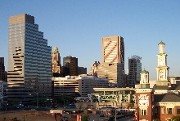O'Malley's State of City Keeps Eye on the Prize: Governor's Mansion
from The League: Reassembled
Mayor Martin O'Malley delivered his annual State of the City address earlier this afternoon. Although most of those in attendance were city officials, the Mayor's message was directed at the larger audience of Marylanders; particularly, those Marylanders who will vote in the gubernatorial election later on this year.
O'Malley wants the state's top job and he knows that he won't get it if his political opponents succeed in portraying him as a failure of a Mayor. Those of us who call this city home need look no further than the chipping paint of the local schools, the dealers who still brazingly operate open-air drug markets and the violence that grips so many of our neighborhoods to know that, unfortunately, these political opponents are right. Sure, things have improved, but not to the point of many of the American cities which faced similar periods of urban decay but have done much better at bouncing back, like Philly. In truth, O'Malley's support in the city is unwaveringly strong nonetheless, so these arguments won't detract too much of the Baltimore vote. The target audience of the Mayor's efforts to defend his record are those who live outside Baltimore and thus could be persuaded that he has made significant improvements.
In this vein, O'Malley compared the city after seven years under his watch to its state when he first took the reins: "by the end of the '90s, the most addicted and violent in America… A city that had lost more of its population and private job base than any other big city in America."
He focused on seven policy areas: public safety, public health, education, fiscal management (as Gov he would be resposible for proposing the state budget), reversal of urban flight, economic growth and job growth.
He focused on specific accomplishments, often directly comparing figures from ten years ago to those of today. For example, while discussing public safety he noted "Ten years ago, 20,000 of our neighbors fell victim to violent crime. By 2005, the number of our neighbors falling victim to violent crime had been driven down to 11,000 - its lowest level in our city since the 1960s."
It was refreshing to be reminded that, for all of our problems, Baltimore has made significant progress in combating urban decay. For instance, the Mayor concluded by mentioning the new YMCA facility on 33rd in Waverly and I always enjoy hearing about things close to home. Despite the upbeat reminders, the Mayor's whitewashing of very real problems whitewashed was disheartening (for example, O'Malley noted that the 2005 murder tally fell by 62 from ten years ago but failing to note that 2005's was higher than 2004).
This was the speech O'Malley needed to give. It was obvious that his gubernatorial ambitions strongly influenced his defense of his record, but nothing else should be expected. Whether or not this could help to ward off opponents' attacks of his mayoral record remains to be seen.
from The League: Reassembled
Text of the State of the City address is provided by the Mayor's Office.
Audio of the speech is provided by WBAL Radio.
from The League: Reassembled
Check out mainstream media coverage of the address
Baltimore Sun
WBAL Radio
ABC 2 News
WBAL TV (text)
WBAL TV (video)
WJZ
Baltimore Business Journal
from The League: Reassembled
Mayor Martin O'Malley delivered his annual State of the City address earlier this afternoon. Although most of those in attendance were city officials, the Mayor's message was directed at the larger audience of Marylanders; particularly, those Marylanders who will vote in the gubernatorial election later on this year.
O'Malley wants the state's top job and he knows that he won't get it if his political opponents succeed in portraying him as a failure of a Mayor. Those of us who call this city home need look no further than the chipping paint of the local schools, the dealers who still brazingly operate open-air drug markets and the violence that grips so many of our neighborhoods to know that, unfortunately, these political opponents are right. Sure, things have improved, but not to the point of many of the American cities which faced similar periods of urban decay but have done much better at bouncing back, like Philly. In truth, O'Malley's support in the city is unwaveringly strong nonetheless, so these arguments won't detract too much of the Baltimore vote. The target audience of the Mayor's efforts to defend his record are those who live outside Baltimore and thus could be persuaded that he has made significant improvements.
In this vein, O'Malley compared the city after seven years under his watch to its state when he first took the reins: "by the end of the '90s, the most addicted and violent in America… A city that had lost more of its population and private job base than any other big city in America."
He focused on seven policy areas: public safety, public health, education, fiscal management (as Gov he would be resposible for proposing the state budget), reversal of urban flight, economic growth and job growth.
He focused on specific accomplishments, often directly comparing figures from ten years ago to those of today. For example, while discussing public safety he noted "Ten years ago, 20,000 of our neighbors fell victim to violent crime. By 2005, the number of our neighbors falling victim to violent crime had been driven down to 11,000 - its lowest level in our city since the 1960s."
It was refreshing to be reminded that, for all of our problems, Baltimore has made significant progress in combating urban decay. For instance, the Mayor concluded by mentioning the new YMCA facility on 33rd in Waverly and I always enjoy hearing about things close to home. Despite the upbeat reminders, the Mayor's whitewashing of very real problems whitewashed was disheartening (for example, O'Malley noted that the 2005 murder tally fell by 62 from ten years ago but failing to note that 2005's was higher than 2004).
This was the speech O'Malley needed to give. It was obvious that his gubernatorial ambitions strongly influenced his defense of his record, but nothing else should be expected. Whether or not this could help to ward off opponents' attacks of his mayoral record remains to be seen.
from The League: Reassembled
Text of the State of the City address is provided by the Mayor's Office.
Audio of the speech is provided by WBAL Radio.
from The League: Reassembled
Check out mainstream media coverage of the address
Baltimore Sun
WBAL Radio
ABC 2 News
WBAL TV (text)
WBAL TV (video)
WJZ
Baltimore Business Journal
from The League: Reassembled






0 Comments:
Post a Comment
<< Home